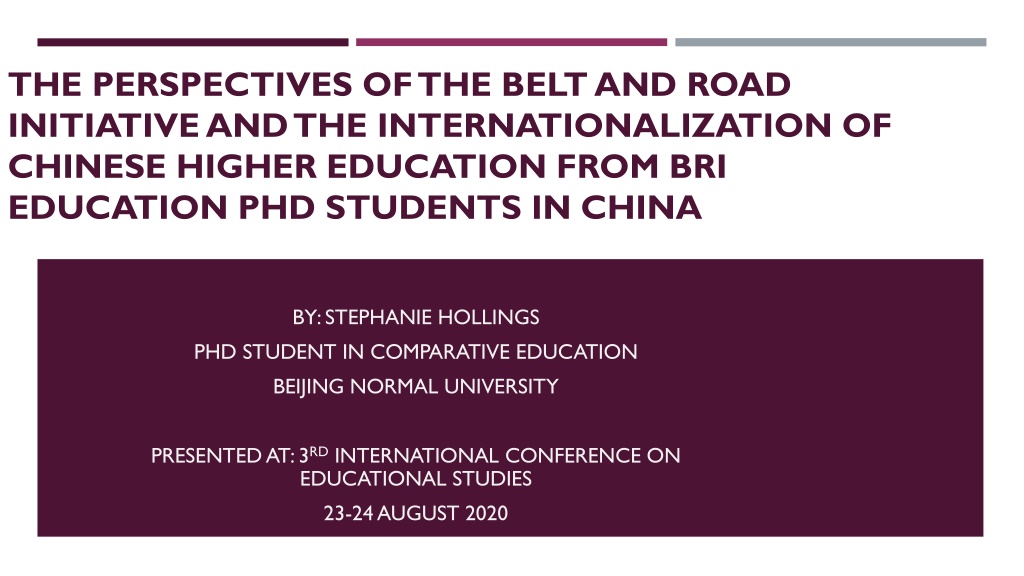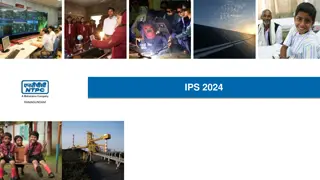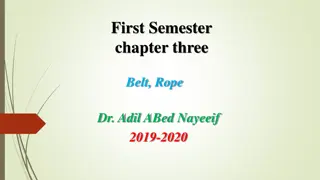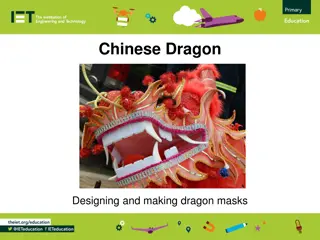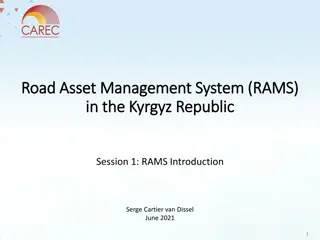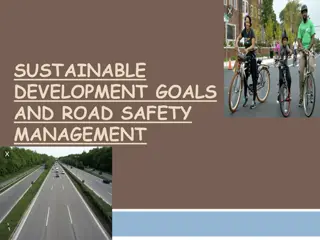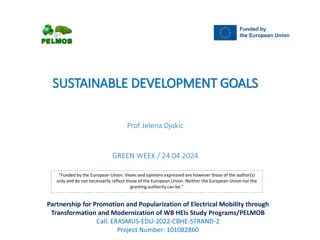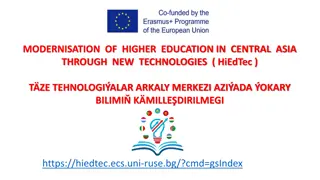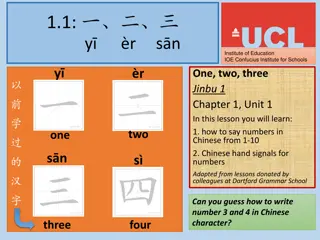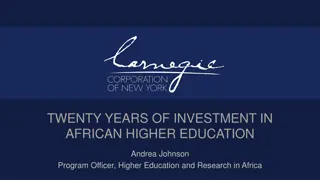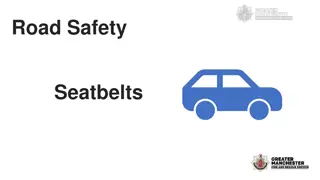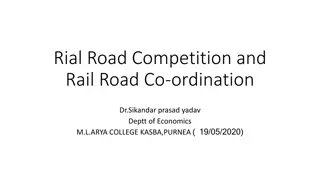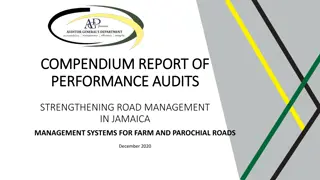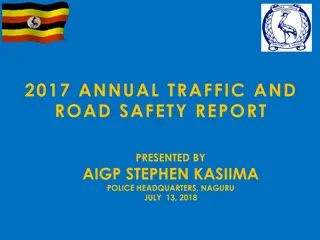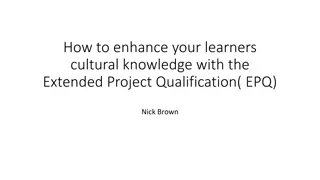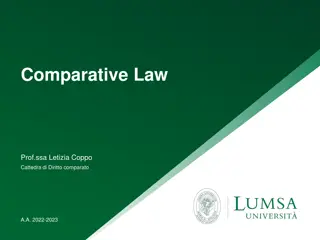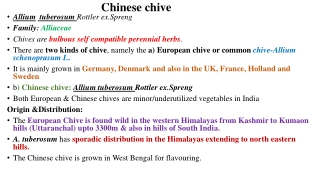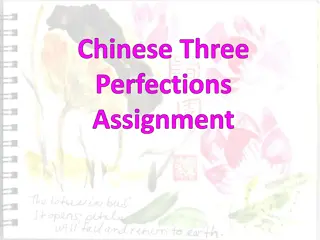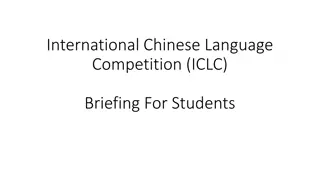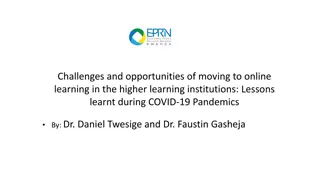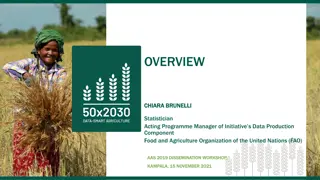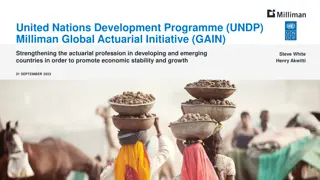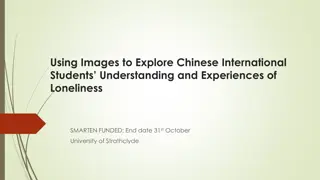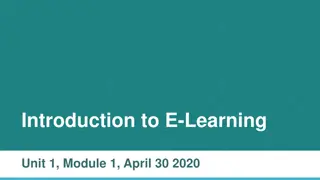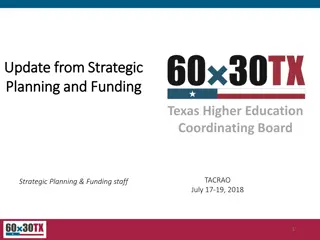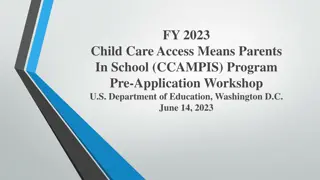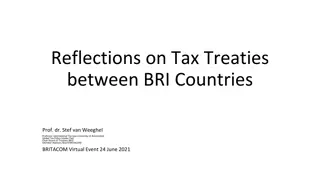Perspectives on Belt and Road Initiative in Chinese Higher Education
The Belt and Road Initiative (BRI) is explored through the lens of Chinese higher education by PhD students in China. The BRI is seen as an essential part of China's global strategy, aiding in economic growth, regional integration, and foreign policy objectives. The emphasis on education within the BRI aims to foster people-to-people bonds, knowledge economy, and a shared future for humanity.
Download Presentation

Please find below an Image/Link to download the presentation.
The content on the website is provided AS IS for your information and personal use only. It may not be sold, licensed, or shared on other websites without obtaining consent from the author. Download presentation by click this link. If you encounter any issues during the download, it is possible that the publisher has removed the file from their server.
E N D
Presentation Transcript
THE PERSPECTIVES OF THE BELT AND ROAD INITIATIVE AND THE INTERNATIONALIZATION OF CHINESE HIGHER EDUCATION FROM BRI EDUCATION PHD STUDENTS IN CHINA BY: STEPHANIE HOLLINGS PHD STUDENT IN COMPARATIVE EDUCATION BEIJING NORMAL UNIVERSITY PRESENTED AT: 3RDINTERNATIONAL CONFERENCE ON EDUCATIONAL STUDIES 23-24 AUGUST 2020
The Perspectives of the Belt and Road Initiative and the internationalization of Chinese Higher Education from BRI Education PhD Students in China
INTRODUCTION The Belt and Road Initiative (BRI) also known as One Belt, One Road was announced in 2013 by the Chinese government in reference to both the Silk Road Economic Belt and 21st- Century Maritime Silk Road. Much has been said about this initiative: Part of Beijing s Go Global strategy China s response to challenges and opportunities of tomorrow (Visvizi et al., 2019, p. 2), In part a reflection of China s emergence as a major economic power, a driver of global economic growth and a catalyst of regional economic integration (Liu & Dunford, 2016, p. 326 ) An essential part of the foreign policy that will allow for the realization of the Chinese dream (Aoyama, 2016, p. 20).
The Five Parts of the BRI This is where I am looking
BRI AS A FORM OF EDUCATIONAL DEVELOPMENT President Xi mentions that he lays particular emphasis on education and that education should go with the trend and, through frequent interaction and exchanges, promote awareness of all human knowledge and cultures as well as recognition of all nations struggles and visions in order to facilitate mutual-understanding among students of all countries (Qu 2018, p.145). Education is also essential in creating people to people bond, or as Qu (2018) explains, the intermingling of cultures (p.147). Education Knowledge economy People to people bonds Community of shared future for mankind / a community of common destiny BRI Chinese Dream
These three concepts of people to people bonds, knowledge economy or cognitive economy and a community of shared future for mankind will play an especially important role in this research, as they can be deemed three of the foremost rhetoric associated with the BRI and higher education, as there is no better way to encourage all three of these concepts than in higher education.
THE INTERNATIONALIZATION OF CHINESE HIGHER EDUCATION Known for being the largest exporter of international students, China has been transforming themselves into an importer of international students in recent years. Wen (2017) states that, the internationalization of higher education has become one of the major strategies countries utilize to educate young talents and yield world-class scientific outcomes and in China s case there are at least four streams of ideologies/theories to explain the rationale of China s inbound international student policies neo-liberalism developmental-state thesis the soft power approach the cultural approach (p.175) Wen (2017) goes on to address the BRI as part of that soft power approach as international education, student mobility, in particular more international students in China will allow for the advancement of both Chinese culture and wisdom in countries that make up the BRI as that will potentially facilitate the connectivity of policy, infrastructure, trade, finance, and people (p.176).
STATISTICS By 2016 Four joint venture institutes 98 education projects in 14 different countries, most of which were BRI countries 134 Confucius Institutes had been established. Also, when it came to Chinese Government Scholarships in the year of 2016, around 60% went to students who came from BRI countries. MoE s Statistical Report on International Students in China for 2018 492,185 international students of which: 59.95% came from Asia 16.57% from Africa 14.96% from Europe 7.26% from America and 1.27% from Oceania -which marked a 1.62% increase in international students from 2017..
THE TOP TEN COUNTRIES REPRESENTED BY STUDENTS STUDYING IN CHINA This shows that a great percentage of those international students are coming from the BRI countries 1. SOUTH KOREA 2. THAILAND 3. PAKISTAN 4. INDIA 5. USA 6. RUSSIA 7. INDONESIA 8. LAOS 9. JAPAN 10. KAZAKSTAN
INTERNATIONAL STUDENT MOBILITY Student mobility has been shown to increase tolerance towards the host country s people and culture and create more awareness of diplomatic relations between the student s home country and host country, as was shown by Nor and Mustafa s (2013) study of Malaysian students in Japan. To further understand this in the Chinese BRI context, the research conducted in this paper will address the perceptions of the BRI countries students who are currently undertaking a PhD in education at Beijing Normal University, on their time in China, the Chinese PhD experience and their perceptions on the BRI. Education is an important part of the BRI and who better to impact that then students studying education. Zhang and Chen (2018), note that one goal of BRI is for, the countries along the route complement each other, open up and cooperate with each other and offer a new stage for international cooperation (p. 2364). Is there truly a better way to encourage international cooperation than through students from the numerous BRI countries studying together?
METHODOLOGY My research began with the question, what perspectives do PhD students in education studying in China, from countries participating in the Belt and Road Initiative have on the initiative. How much did they know about the initiative, did that initiative affect their choice to study in China, what do they think of the rhetoric of the BRI, and how will that influence them as education students? Education students in particular have the potential to have great influence back in their home countries, as education in itself is influential. Whether they go on to teach high school or university, they will be in direct contact with future generations. Therefore, their potential for influence is great, especially with concepts such a community of shared future for mankind , knowledge economy, and with the promotion of the exchange of both education and culture in the realization of mutual understanding (Jiang & Shi 2019, pp.75-76).
METHODOLOGY Semi-structured interview of 9 students in English-taught education PhD, who started the program in 2017, 2018, or 2019, and come from BRI countries Theory: Grounded Theory Phenomenological approach
TABLE 1: INTERVIEWED STUDENTS DEMOGRAPHICS B & R economic corridor/ route Gender Marriage status Pakistan- China/ South Asia Male Married South Asia Female Married Pakistan- China/ South Asia Female Unmarried Bangladesh- China- India- Myanmar/ South Asia Male Unmarried The 21st Century Maritime Silk Road route (Middle East) Male Unmarried The 21st Century Maritime Silk Road route. (North Africa) Male Unmarried The 21st Century Maritime Silk Road (Europe) Male Unmarried Eurasia Female Unmarried Southeast Asia Female Unmarried
Why did you chose to study in China for a PhD? Actually, I got my admission from other universities. I got more scholarship than here. But I choose this because my wife got admission here. Scholarships I wanted to come to Asia to study Interested in something new and becoming more special How do you see your role as a PhD student? In China, I think they are still holding the Confucian tradition, so you are still a student ..I see myself as a researcher of course Teacher educator We could play a more professional role- junior faculty, lectureship, rather than merely a student in senior classes all the arrangements are based on studentship When we are doing a PhD we do not just want to limit ourselves as a student, we want to be a researcher . What have been your main challenges while being a PhD student in China? Language Accommodation Cultural/religion interrelated These are not mutually exclusive but seem to be
What are your plans for after your PhD? Get a job back home, that benefits my country - it is not practical to stay in China- cant buy a house What aspects of studying in China do you see as beneficial to you as an education student? If I stay in Ukraine, I will be the same You learn from Chinese culture and share something from yours How do you view the PhD experience in China? Great, fun, it is a learning opportunity If you do not speak Chinese- you will feel pressure A unique opportunity to see educational policies in the making A great opportunity to compare educational systems How do you see your PhD experience as a benefit to China? **** I explore the education system in China. So, from an outside perspective For example, if I will go back, then I will be in the University of Pakistan, and I will definitely know the professor there. We can have a link. We can have the bridge for research like those . Not just a simple PhD student - making connections between previous university and Chinese university China has a neat, clean, robust ambition to market worldwide we are the materialization of that dream. Would you recommend for other people to come to China for PhD study? Why or why not? China is different than what we think it is Unique experience - coming to study in China is like having a bite of the food (the culture)
What do you know about the Belt and Road Initiative? So, that is very famous in Pakistan now. Because economy because China invests a lot in Pakistan, because of that. And Pakistan s economy is becoming better, because of that. And like a lot of people are getting to know about China, about this co-relationship. Because of this scholarship, a lot of people are coming here also. So, this is the things beneficial to different countries out of China Everyone wants strong friends Everyone is focused on China An interconnectivity between nations , me being here is part of that initiative How important do you see your country is in this initiative? (GEOGRAPHICAL IMPORTANCE) Egypt is an ancient country- it influences and gets influenced - they are trying to establish wise connections Very important - we are a neighbor of China and share a border and make it easier for China to trade with the Middle East. Using a port in their country. In terms of location, it is very important but in terms of contribution, I do not think that important In your opinion does China do a good job of recruiting talent from your country for PhD programs? Yes, agencies come and interview students - my country is a priority country The Belt and Road Scholarship is somewhat political- does not pull original talent Not as good as it should be. There should be more invitations, promotions, and bringing in talent, not just anyone China is investing in our country. So, it is kind of that they build a trust with the people of Pakistan. As a girl, when I said to my family that I want to do a PhD in China, they said okay. So, it would be like doing investment in our country, our home land. They build up the trust .
In what aspects have you felt social and cultural exchanges in China? People to people bonds? No, we are given tasks to be engaged with other jobs, but not in the situation to be connected but still more connected than if outside China PhD bubble I think that education is the most important aspect, I know many students they are under this project I felt here that this kind of initiative is closing the gap between the people of different countries, like we each have a very different culture compared to China. We do not know. We just learn from the book that there is China, and there is a lot of weird things there. So, we come here, we start to talk with Chinese people. We come to know their culture I do not have many Chinese friends, here I have more friends that are not Chinese . some people come and ask to take my WeChat but just want to practice English maybe it is normal friendship in China Do you feel more connected to China and Chinese people now that you have experience in China? Time builds bonds if there was no language barrier, it would be easier for me How do you understand knowledge economy ? Knowledge sharing- when we share knowledge, we disattach it form the economy and politics, knowledge is then free People are coming here for their PhD. They are also getting knowledge from their research and China is also getting benefits from this research If you have the ability to learn something, you should take that chance, because someone else already has I am a PhD student in education, and if I get my diploma and my topic is super important and adds on to the knowledge economy, then I have the chance to influence the world. China helps put us in a better position for that What does a community of shared future for mankind mean to you and can it be related to your time in China as a PhD student? it is a very nice statement. Anyone who has traveled abroad will understand. When we get to see other people, their successes, their failures, we get to learn, to influence, and help each other When we meet people from other cultures, it helps open our minds It is a type of motivation but abstract and can not define the real world Making globalization easier How do you see your experience as adding to your image as a global citizen? Seeing that I am not the only person in the world, my country is not the only country, the thoughts of my community are not the only ones .. Like going into mines, you can find gold in each mine I feel like I am more part of a global world
How have you come to see China through your time here? Has your idea of China changed through your time here? Some stereotypes disappear, some new ones appear Before coming, I thought China is not good for education, but what I think now is different Before coming you hear China is poor and developing but that is not true you see development take place efficiently and effectively . Change of preconceived notions .. become more of a global citizen What will you tell people back home about your time in China? The truth- it is a different world. we understand the world differently. What is normal in China is abnormal in my country It can be difficult for Muslim students Great, the people here want to talk to you I spent almost five or six years here and they help us a lot If you chose to continue in education, how will your time in China, influence that? For example, your teaching style, research methods, etc.? I can adopt what I learned in China (teaching and research methods) We see what we can take, what we should not take, and what does and does not work I will have to prove myself after doing my degree in China - practical concern I will have stayed here for three influential years
KEY POINTS Language and PhD Bubble Language seemed to play the biggest role as the paramount challenge, with one student lamenting that he wished the university would allow more access to language courses beyond the introduction course that is mandated by the Chinese Ministry of Education. Highlighting the lack of investment the university seems to show in facilitating the international student s understanding of the both the language and culture, which inevitably has led to many issues for these students, and seemingly at odds with much of what is touted as the reasons for this turn to internationalization of the Chinese higher education and the BRI. A few students mentioned that while they feel closer to the Chinese and China than they did before coming to China, it was still like they were living in a PhD bubble, insulated and cutoff from the real China. Thus how could they be expected to form bonds with people, that they never come in contact with, outside of the narrow time they spent doing activities like going to the bank. With no classes with Chinese students and limited opportunities for interactions even within the university, it seemed that the bonds were deemed hard to form, unless one went of their way to do so.
Cultural Another similar issue was the difference in cultural and how that can manifest itself in cultural misunderstandings as was mentioned by one student, who pointed out that being a Muslim, that some of her religious and cultural needs seemed to be ignored by the university. Furthermore, it seemed that the cultural views of friendship also bore some responsibility for the lack of bond creation. Transactional type of friendship, one in which I help you, you help me (as expressed by another interviewee, who has spent a vast part of her adult life in China). Clustering of students from the same country
HOW THE STUDENTS SAW THEMSELVES AS BEING A BENEFIT TO CHINA??? Students chose to stress that China is trying to go global and market its education and in some ways they are the materialization and embodiment of that dream. The rationalized that their presence in China was adding to the diversity that Chinese higher education was searching for, but not just in terms of nationalities but also adding diversity in terms of exchanging ideas and research. Others saw themselves as benefiting China by producing research, exploring the Chinese education system as an outsider, bringing in new perspectives and cultures and building connections between their countries, seemingly continuing to stress the people to people bonds and knowledge economy. This was brought to highlight examples from two different students. One mentioned that when he graduates and goes back to teach at universities in his country, he will still have ties and connections with Chinese professors. Another student mentioned that recently, his old supervisor from his home country approached him about creating a link between his Ukrainian university and his new Chinese one. He acknowledged that as a student in China, he is not just a simple PhD student but a bridge and diplomat of two education systems. In other words, they saw themselves as an essential aspect of the growing knowledge economy and in facilitating bonds, therefore helping to promote a community of shared future for mankind , although most did not directly make this connection or understand their role in the promotion of BRI rhetoric.
CONCLUSION This study has numerous future implications. It draws on the concerns of international PhD students at a famous university in Beijing. Most importantly it draws on the concerns of future education leaders in the BRI countries. Answers from the students have highlighted issues such as even though these students have a greater understanding of China, these students still do not feel so connected to the country that they are living in for their PhD duration. Yet, the experience was seen as mostly positive, contributing to them as researchers, global citizens, while giving them unique opportunities for building connections, bridges, and future research opportunities between the student s home country and China. The students interviewed echoed similar sentiments that through their time in China, their preconceived notions of China had been changed and that not only have they benefited from China but they also saw China as benefiting from them. Many of these people to people bonds were shown to have been created and that their time in China will be influential when they go back to their home countries and continue on their educational journeys.
Although, it seemed that many lacked the people to people bonds with the Chinese, often viewing themselves as in a bubble or commenting on a lack of Chinese friends, which may once again highlight communication difficulties that most students mentioned but it also relates back to Zhang and Chen (2018) spoke about the BRI countries opening and cooperating with each other as a new stage of international cooperation, as most students spoke in positive terms of creating bonds with other international students. These people to people bonds were being created but not necessarily with the Chinese. Identity- the students perceived and the university s assigned for them was a key issue. Which gives many opportunities for further research by including a larger sample size, including BRI countries students who study PhD programs in Chinese, and maybe even students who have returned home. Issues have been raised about recruiting of talent from BRI countries, how to attract more students, students from BRI countries main concerns such as family, educational reputation, etc., and policies on international students with regards to aspects such as language courses, accommodation, and meeting religious and societal needs of the students.
FINAL THOUGHTS The ancient Silk Road was always more than just a trade route. In its essence, it was a place for the trade of knowledge, ideas, social capital, and knowledge economy or cognitive economy . More than that it stood for the transfer of technology, like paper, creating webs of knowledge , and creating cultural understanding (La Vaissiere 2014, Peters 2019). At the bottom of all of this is education. Education is in its most basic form is nothing more than ideas exchange and is not that what the new BRI is truly about and what the ancient Silk Road was.
In some senses, it appears that the BRI is living up to its rhetoric, at least from what these students have said, bonds have been created, knowledge and ideas have been exchanged, but it seems that there are still many issues that need to be addressed before a community of shared future for mankind can be realized.
REFERENCES Andersson, J., Sadgrove, J., & Valentine, G. (2012). Consuming Campus: Geographies of Encounter at a British University. Social and Cultural Geography, 13 (5), 501 515. doi: 10.1080/14649365.2012.700725 Aoyama, R. (2016). One Belt, One Road : China's New Global Strategy. Journal of Contemporary East Asia Studies, 5(2), 3-22. doi: 10.1080/24761028.2016.11869094 Australian Department of Education. (2017). China s belt and road initiative-education , available at: https://internationaleducation.gov.au/International- network/china/PolicyUpdates-China/Pages/ Chinas-Belt-and-Road-Initiative-.aspx (accessed 23 July 2019). Bilecen, B. (2013). Negotiating differences: cosmopolitan experiences of international doctoral students. Compare: A Journal of Comparative and International Education, 43(5), 667- 688. doi: 10.1080/03057925.2013.821329 Caruana, V. (2014). Re-thinking Global Citizenship in Higher Education: from Cosmopolitanism and International Mobility to Cosmopolitanisation, Resilience and Resilient Thinking.Higher Education Quarterly,68(1), 85 104. doi: 10.1111/hequ.12030 Cheng, Y. (2018). Public Opinions on the Belt and Road Initiative: A Cross-Cultural Study. InY. Cheng, L. Song, & L. Huang (Eds.). The Belt & Road Initiative in the Global Arena (pp. 3 16). Singapore: Palgrave Macmillan. Chiang, S. (2015). Cultural Adaptation as a Sense-Making Experience: International Students in China.Int. Migration & Integration, 16,397 413. doi: https://doi.org/10.1007/s12134- 014-0346-4 Cotterall, S. (2015). The rich get richer: international doctoral candidates and scholarly identity. Innovations in Education and Teaching International, 52(4), 360-370. doi: 10.1080/14703297.2013.839124 De la Vaissi re, . (2014). Trans-Asian trade, or the Silk Road deconstructed (antiquity, middle Cambridge History of Capitalism (pp. 101- 124). Cambridge: Cambridge University Press. doi:10.1017/CHO9781139095099.005 ages). In L. Neal & J. Williamson (Eds.).The
Fincher, R. (2011). Cosmopolitan or ethnically identified selves? Institutional expectations and the negotiated identities of international students. Social & Cultural Geography, 12(8), 905-927. doi: 10.1080/14649365.2011.624193 Jiang, T., & Shi, L. (2019). The Way of the International Cooperation of Higher Education doi: 10.11648/j.sjedu.20190703.12. Under the Strategy of "The Belt and Road". Science Journal of Education, 7(3), 73-80. Kaufman, P., & Feldman, K. A. (2004). Forming Identities in College: A Sociological Approach.Research in Higher Education 45(5), 463 496. doi: https://doi.org/10.1023/B:RIHE.0000032325.56126.29 Kim, J. J. (2019). Conceptualising global competence: situating cosmopolitan student identities within internationalising South Korean Universities. Globalisation, Societies and Education, 17(5), 622-637. doi: 10.1080/14767724.2019.1653755. Liu, W. D., & Dunford, M. (2016). Inclusive globalization: unpacking China's Belt and Road 0.1080/23792949.2016.1232598 Initiative. Area Development and Policy, 1(3), 323-340. doi: Lomer, S. (2018). UK policy discourses and international student mobility: the deterrence and subjectification of international students. Globalisation, Societies and Education, 16(3), 308-324. doi: 10.1080/14767724.2017.1414584 Madge, C., Raghuram, P., & Noxolo, P. (2009). Engaged Pedagogy and Responsibility: A Postcolonial Analysis of International Students. Geoforum; Journal of Physical, Human, and Regional Geosciences, 40(1), 34 45. doi: https://doi.org/10.1016/j.geoforum.2008.01.008. Ministry of Education. (2018, April 1). Reports. Retrieved October 10, 2019, from http://en.moe.gov.cn/documents/reports/201901/t20190115_367019.html. Ministry of Education. (2019, April 18.). Reports. Retrieved October 10, 2019, from http://en.moe.gov.cn/documents/reports/201904/t20190418_378692.html. Moskal, M., & Schweisfurth, M. (2018). Learning, using and exchanging global competence in the context of international postgraduate mobility. Globalisation, Societies and Education,16(1), 93-105. doi: 10.1080/14767724.2017.1387768 Peters, M. A. (2019). China s belt and road initiative: Reshaping global higher education. Educational Philosophy and Theory, 52(6), 586-592 doi: 10.1080/00131857.2019.1615174. Qu, Z. (2018). On Further Promoting Cooperation and Development of Education Among Countries Along the Belt and Road. In W. Liu (Ed.). China s Belt and Road Initiatives (pp.141-155). Shanghai: Shanghai Jiao Tong University Press and Springer Nature Singapore pte. Ltd.
Rosenthal, D., Russell, J., & Thomson, G. (2006). A Growing Experience: The Health and Well- Melbourne. Melbourne: Key Centre for Women s Health in Society, University of Melbourne. Being of International Students at the University of Schultz, L. (2007). Educating for global citizenship. The Alberta Journal of Educational Research, 5(3), 248 258. The CPC Central Committee and the State Council issued the "Opinions on the work of the opening-up of education in the new era". (n.d.). Retrieved March 1, 2020, from https://internationaleducation.gov.au/International-network/china/PolicyUpdates- China/Documents/Opinions on the work of the opening-up of education in the new era -English translation.pdf Visizi, A., Lytras, M. D., & Zhang, X. (2019). The Belt and Road Initiative: Strategy, Collaboration, Innovation. InA. Visvizi, M. D. Lytras, W. Alhalabi, & X. Zhang (Eds.). THE NEW SILK ROAD LEADS THROUGH THE ARAB PENINSULA: MASTERING GLOBAL BUSINESS AND INNOVATION (pp. 1 14). Bingley, UK: Emerald Publishing Limited. Wen, W. (2018). Inbound international student policies in China: a historical perspective, Asian Education and Development Studies, 7(2), 174- 183. doi: https://doi.org/10.1108/AEDS- 09- 2017-0097. Yan, Y., Tan, H. Y., Li, W. Q., & Yi, Z. Y. (2019). Research on the Education of International Students from ASEAN to China under the Perspective of Belt and Road . 2019 3rd International Conference on Economics, Management Engineering and Education Technology (ICEMEET 2019), 1752-1757. doi: 10.25236/icemeet.2019.358 Zhang, Z. Z., & Chen, Y. (2018). A study on the Path of Internationalization Transformation and Development of Higher Education Under the Strategy of Belt and Road . Educational Sciences: Theory & Practice, 18(5), 2363-2372, doi:10.12738/estp.2018.5.135.
